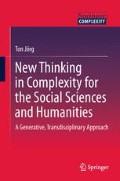Abstract
This book may be viewed as a complex book about the topic of complexity. It is both critical of the present state of art in the social sciences and constructive in its view about the possibility of building a new science for the future. A science that takes the complexity of reality as real. A science that is based on a new framework: a framework that does not yet exist. The new framework, therefore, will be a framework that has to be invented.
Access this chapter
Tax calculation will be finalised at checkout
Purchases are for personal use only
Notes
- 1.
See Margaret Archer [2000], p. 306.
- 2.
He lived from 1896–1934.
- 3.
The ‘most simple’ cases are very complex, – one cannot be surprised enough about that!
References
Archer, M. (2000). Being human: The problem of agency. Cambridge: Cambridge University Press.
Bhaskar, R. (2002). Reflections on meta-reality: Transcendence, emancipation and everyday life. New Delhi: Sage Publications.
Biesta, G. (2006). Beyond learning: Democratic education for a human future. Boulder: Paradigm Publishers.
Bohm, D. (1996). On creativity. London: Routledge.
Brockman, J. (1995). The third culture: Beyond the scientific revolution. New York: Simon and Schuster.
Brockman, J. (2006, January 1). Edge The World Question Center. The Huffington Post, pp. 1–2. Retrieved July 24, 2007, from http://www.huffingtonpost.com/john-brockman/the-edge-annual-question_b_13106.html
Davis, B., & Sumara, D. (2006). Complexity and education: Inquiries into learning, teaching, and research. Mahwah: Lawrence Erlbaum Associates.
Gohr, S. (2000). Magritte. San Francisco: Abrams Inc.
Jardine, D. W., Friesen, S., & Clifford, P. (2006). Curriculum in abundance. Mahwah: Lawrence Erlbaum Associates.
Jörg, T. (2004a). A theory of reciprocal learning in dyads. Cognitive systems 6(2, 3) 159–170. Groningen: European Society for the Study of Cognitive Systems (ESSCS).
Jörg, T. (2004b). Complexity theory and the reinvention of reality of education. In Proceedings of the 2004 complexity science and educational research conference (pp. 121–146), September 30–October 3, 2004. Canada: Chaffey’s Locks. (http://www.complexityandeducation.ca)
Kauffman, S. (1995a). Investigations. New York: Oxford University Press.
Kauffman, S. (1995b). At home in the universe. New York: Oxford University Press.
Kuhn, T. S. (1970). The structure of scientific revolutions (2nd ed.). Chicago: Chicago University Press.
Morin, E. (2001). Seven complex lessons in education for the future. Paris: UNESCO Publishing.
Schama, S. (2006). The power of art. London: BBC Books.
Simon, H. A. (1996). The sciences of the artificial. Cambridge: MIT Press.
Snow, C. P. (1959). The two cultures. Cambridge: Cambridge University Press.
Stanley, D. (2005). Paradigmatic complexity: Emerging ideas and historical views of the complexity sciences. In W. C. Doll Jr., M. J. Fleener, D. Trueit, & J. St.Julien (Eds.), Chaos, complexity, curriculum, and culture (pp. 133–151). New York: Peter Lang.
Von Foerster, H. (1993). Understanding understanding. New York: Springer.
Vygotsky, L. (1987a). Thought and language (A. Kozulin Ed. & Trans.). Cambridge (MA): The MIT Press.
Vygotsky, L. (1987b). In R.W. Rieber & A.S. Carton (Eds.), The collected works of L.S. Vygotsky (Problems of general psychology, Vol. 1). New York: Plenum Press.
Wertsch, J. V. (1998). Mind as action. New York: Oxford University Press.
Author information
Authors and Affiliations
Corresponding author
Rights and permissions
Copyright information
© 2011 Springer Science+Business Media B.V.
About this chapter
Cite this chapter
Jörg, T. (2011). Introduction. In: New Thinking in Complexity for the Social Sciences and Humanities. Springer, Dordrecht. https://doi.org/10.1007/978-94-007-1303-1_2
Download citation
DOI: https://doi.org/10.1007/978-94-007-1303-1_2
Published:
Publisher Name: Springer, Dordrecht
Print ISBN: 978-94-007-1302-4
Online ISBN: 978-94-007-1303-1
eBook Packages: Humanities, Social Sciences and LawSocial Sciences (R0)

